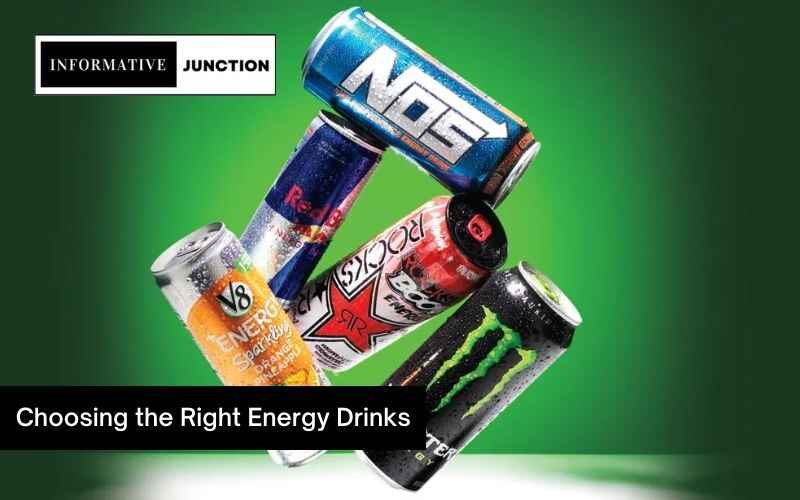In today’s fast-paced world, energy drinks have become a popular choice for people looking to boost their energy levels and stay alert throughout the day. These beverages promise a quick and convenient source of energy, making them a go-to option for students, professionals, and anyone seeking an energy boost. However, not all energy drinks are created equal, and choosing the right one can be a daunting task. Apply our top store Wraith Energy Coupon Code to get the best deals and offers on your order. In this comprehensive guide, we will explore the factors you should consider when selecting an energy drink, as well as the potential risks and benefits associated with their consumption.
Understanding Energy Drinks
Energy drinks are beverages that typically contain caffeine, vitamins, amino acids, and other ingredients designed to provide a quick energy boost. They are marketed as a way to enhance alertness, concentration, and physical performance. While they can be effective in providing a short-term energy boost, it’s essential to choose wisely to avoid potential health risks and ensure you get the desired benefits.
Choosing an Energy Drink: What to Look For
Caffeine Content
Caffeine is the primary ingredient responsible for the stimulating effects of energy drinks. While it can enhance alertness and combat fatigue, excessive caffeine consumption can lead to side effects such as jitteriness, anxiety, and insomnia. When choosing an energy drink, consider your tolerance for caffeine and aim for a product with a moderate caffeine content, usually between 50-200 milligrams per serving. It’s essential to be aware of your personal caffeine sensitivity to avoid potential adverse effects.
Sugar Content
Many energy drinks are loaded with sugar, which can provide a quick energy spike but may lead to a subsequent crash. High sugar intake can also contribute to weight gain, dental problems, and an increased risk of chronic diseases like diabetes. Look for energy drinks with lower sugar content or those that use alternative sweeteners such as stevia or erythritol. It’s essential to read the label and be mindful of hidden sources of sugar in energy drinks.
Calories
In addition to sugar, the total calorie content of energy drinks can vary significantly. If you’re watching your calorie intake, opt for low-calorie or zero-calorie energy drinks. Keep in mind that some energy drinks may contain added ingredients like amino acids, which can increase the calorie count. Always check the nutritional information on the label to make an informed choice.
Added Ingredients
Many energy drinks include various added ingredients such as vitamins, amino acids, and herbal extracts. These components can have both positive and negative effects on your health. For instance, B vitamins can support energy metabolism, while taurine and L-carnitine may help with physical performance. Be aware of the specific ingredients and their potential benefits and side effects before choosing a product.
Brand and Reputation
Not all energy drink brands are created equal. Some companies prioritize quality and safety, while others may cut corners to maximize profits. Research the reputation of the brand and read reviews from consumers to gain insight into the product’s effectiveness and safety. Reputable brands often invest in research and quality control to ensure their products meet the highest standards.
Packaging and Portability
Consider the packaging of the energy drink, especially if you lead a busy lifestyle. Some energy drinks come in convenient resealable bottles, while others are available in cans or smaller single-serving containers. Choose a format that suits your daily routine and activities, whether it’s for work, exercise, or on-the-go energy.
Personal Health Considerations
Before incorporating energy drinks into your daily routine, it’s crucial to consider your personal health status and any underlying medical conditions. Individuals with heart conditions, high blood pressure, or anxiety disorders may be more susceptible to the adverse effects of energy drinks. It’s essential to consult with a healthcare professional if you have any concerns about how energy drinks may impact your health.
Potential Benefits of Energy Drinks
Energy drinks can offer several potential benefits, provided they are consumed responsibly and in moderation. Some of these benefits include:
- Improved Alertness: The caffeine in energy drinks can enhance alertness, concentration, and cognitive performance, making them useful for tasks that require focus and attention.
- Enhanced Physical Performance: Some energy drinks contain ingredients like taurine and L-carnitine, which may help improve physical performance and reduce muscle fatigue during exercise.
- Convenience: Energy drinks are portable and easy to consume, making them a convenient option for people with busy schedules or those in need of a quick energy boost.
- Mood Enhancement: Caffeine can have a positive impact on mood by increasing the release of neurotransmitters like dopamine and norepinephrine, which can help combat feelings of tiredness and low energy.
Potential Risks of Energy Drinks
While energy drinks can offer benefits, they also come with potential risks that consumers should be aware of:
- Caffeine-Related Side Effects: Excessive caffeine consumption can lead to side effects such as jitters, anxiety, heart palpitations, and insomnia.
- Sugar-Related Health Risks: High sugar content in energy drinks can contribute to weight gain, obesity, dental problems, and an increased risk of diabetes.
- Dehydration: Caffeine is a diuretic, which means it can lead to increased urination and potentially contribute to dehydration if not accompanied by sufficient water intake.
- Potential Interactions: The combination of caffeine and certain medications or medical conditions may lead to adverse interactions.
- Risky Behavior: Some individuals may engage in risky behaviour, such as excessive alcohol consumption or mixing energy drinks with alcohol, which can have adverse consequences.
Conclusion
Choosing the right energy drink requires careful consideration of various factors, including caffeine content, sugar, calories, added ingredients, brand reputation, packaging, and personal health considerations. While energy drinks can provide a quick energy boost and enhance alertness and physical performance, it’s essential to consume them in moderation and be aware of potential risks and side effects. Looking for some fantastic savings on your favorite energy drinks? Head over to ScoopCoupons, your one-stop destination for incredible deals.




